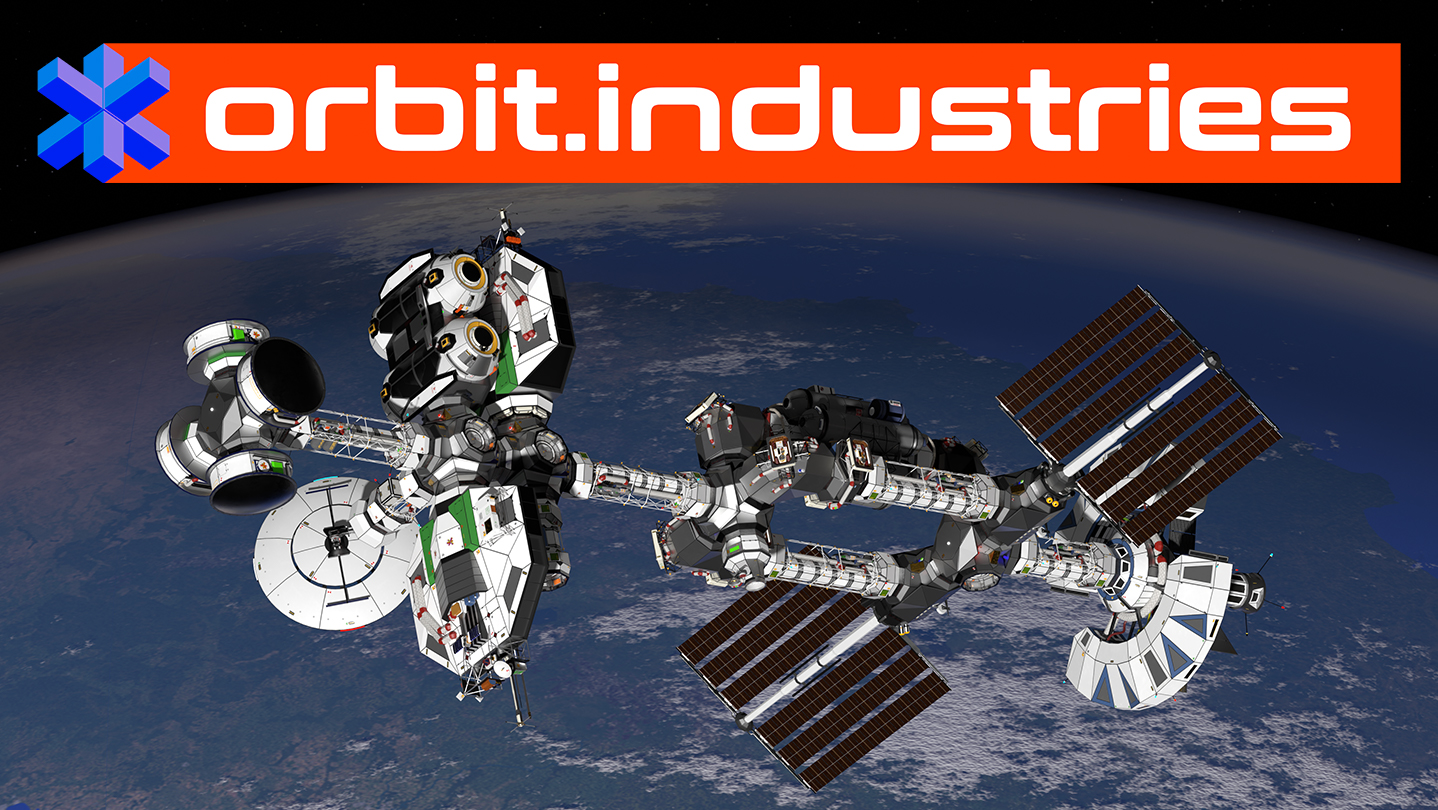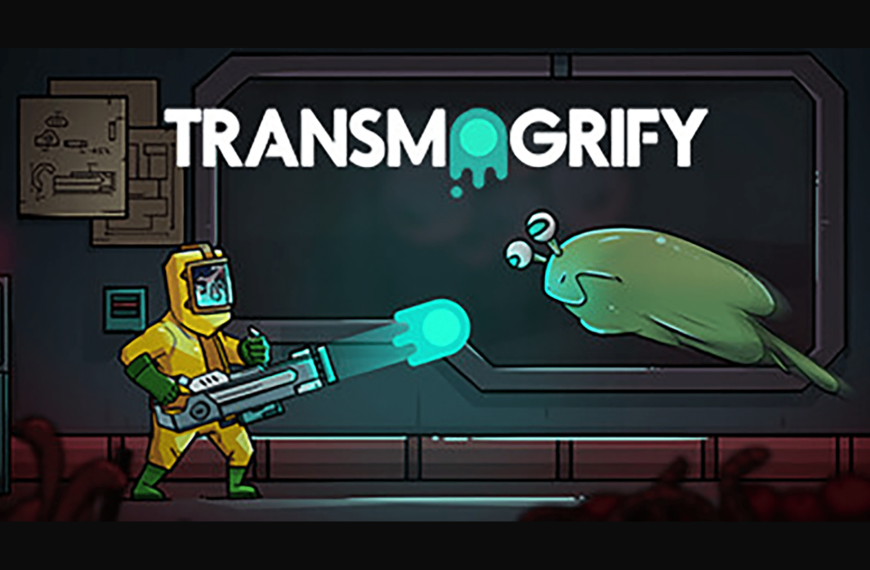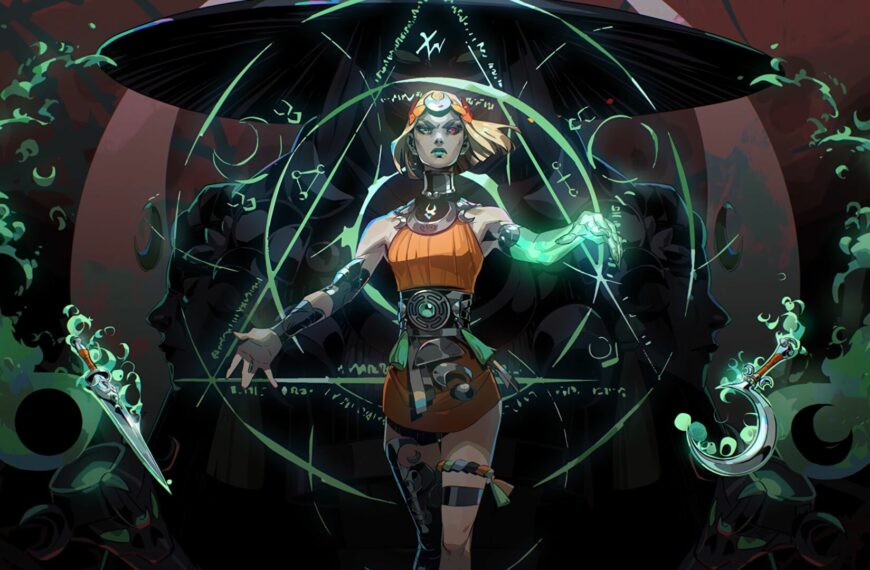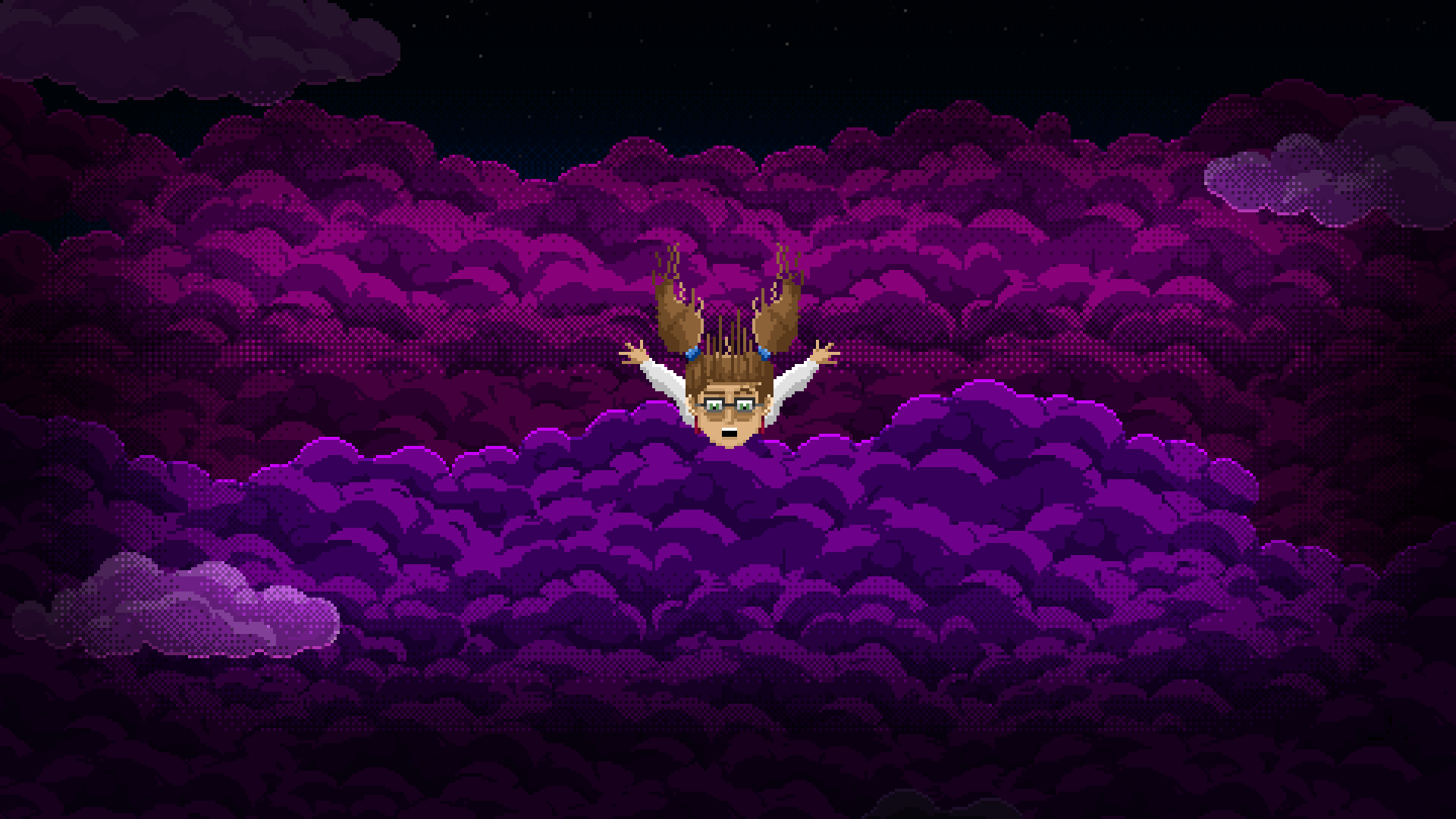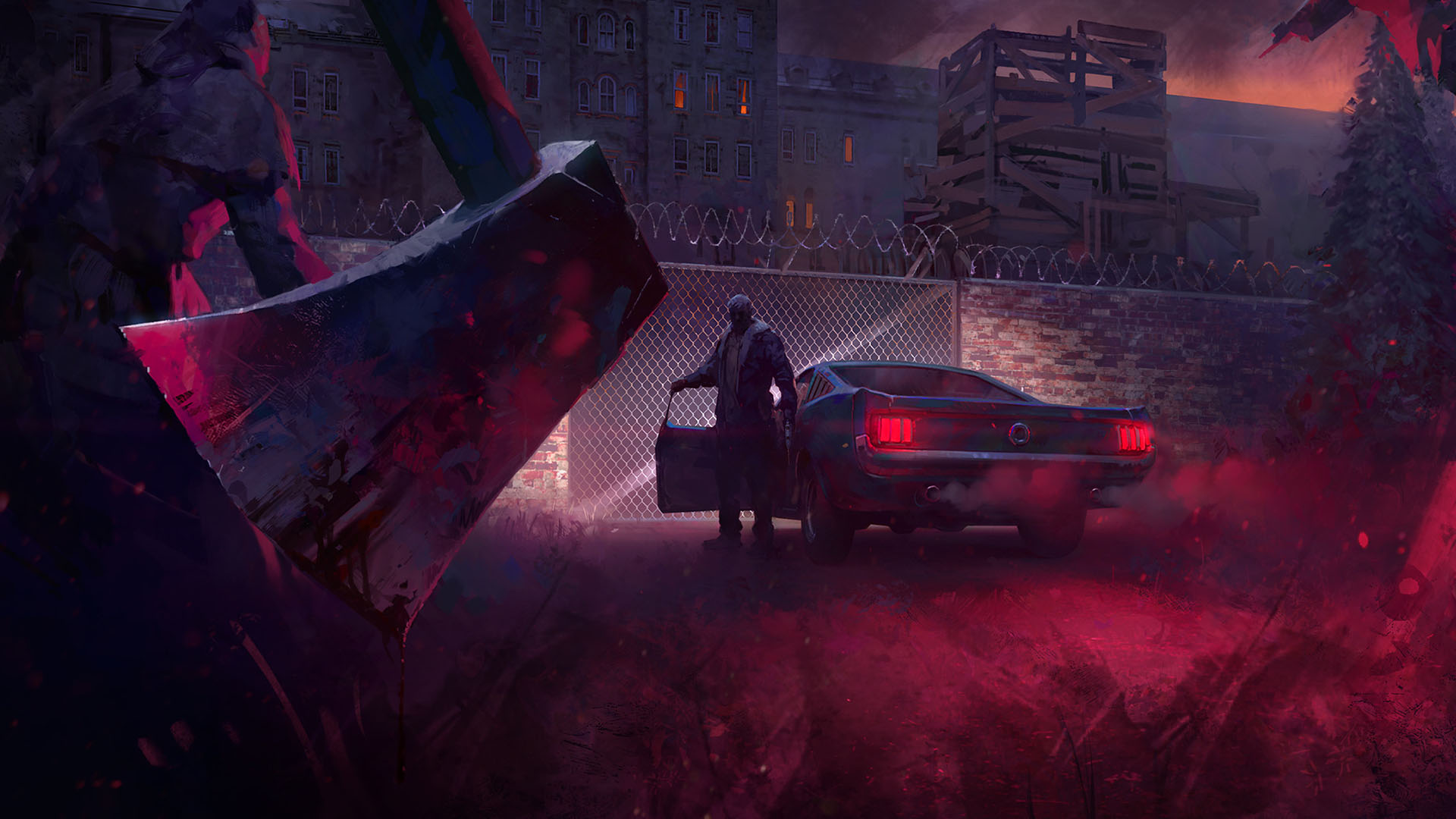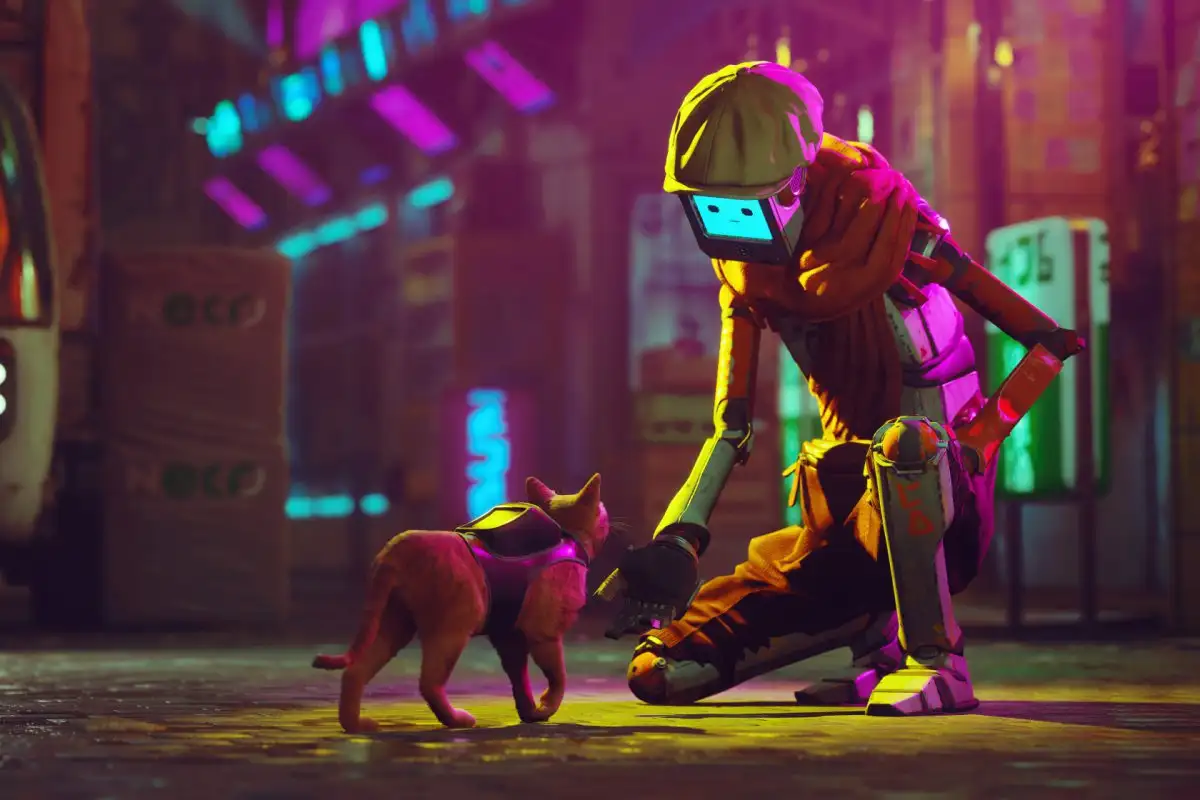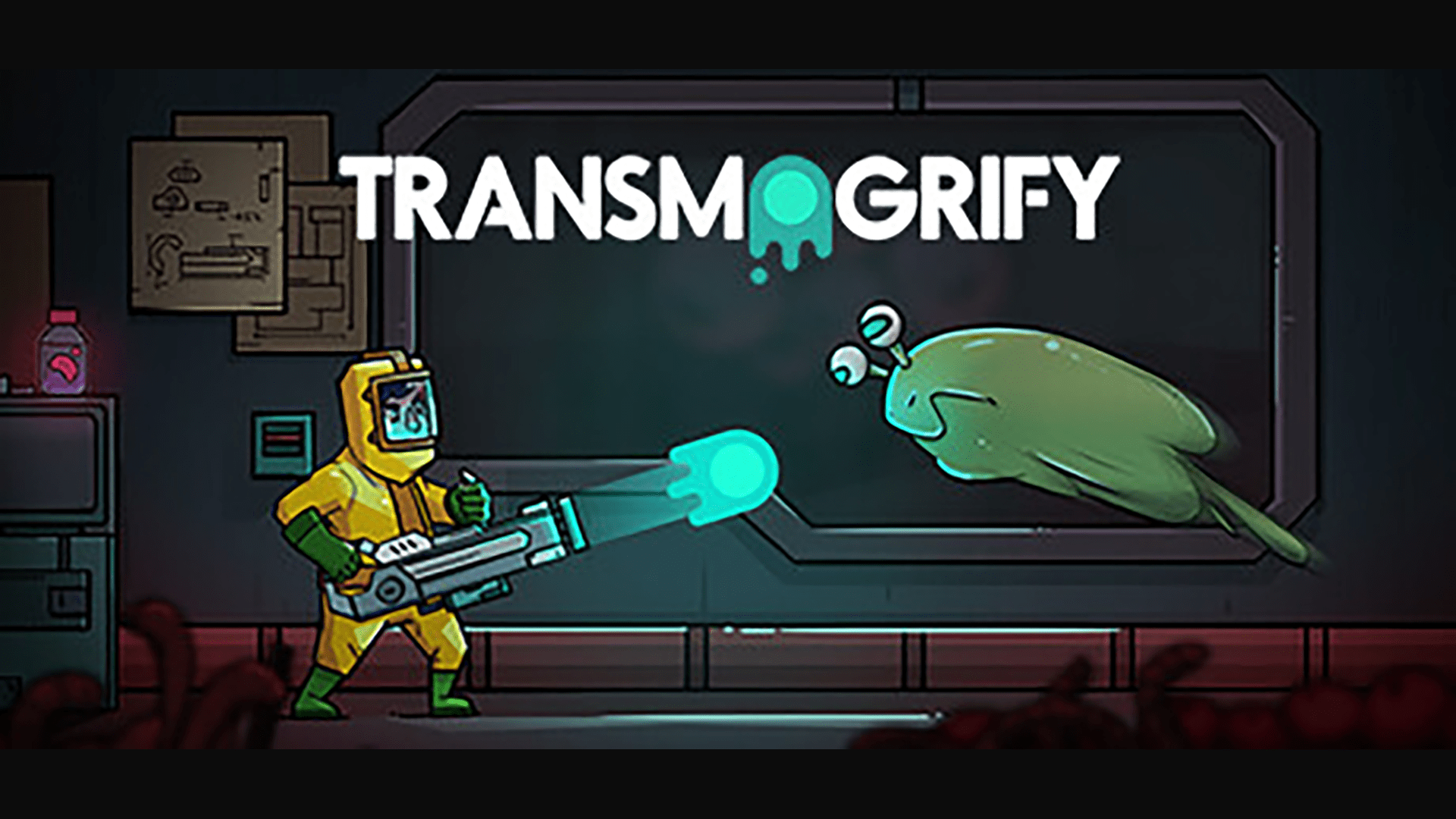Stuttgart-based indie developer LAB132 has teamed up with indie publisher Klabater to release orbit.industries. Coming to PC, Xbox, Playstation and Nintendo Switch on April 21st, the team at LAB132 answered some questions over email about the meticulous research they put into the real life space engineering and science that inspired the game and how their recently wrapped Open Beta has helped guide them towards launch.
What were the initial ideas and inspirations behind orbit.industries?
LAB132: The initial idea or a spark for it came from our founder Benjamin’s infatuation with space, science fiction and space exploration at large.
Benjamin has been a lifelong Stark Trek fan and it’d been a key driving force in terms of his design and programming decisions for the game – spending hours and days researching constellations, terraformation and other details that would make realistic modeling for our own game and realistic to players just as into this subject matter as Benjamin himself.
Included from LAB132’S Dev Blog on inspirations;
The initial theme for the game came from personal interest of the Lead Designer. In his spare time, he is fascinated by astronomy and is very interested in all topics revolving around space exploration, Science Fiction movies, series and books. That is why a lot of the games inspiration is drawn from classic Sci-Fi literature and cinema, like Babylon 5, but most importantly the Star Trek franchise. This series has the most influence on how the overall game looks and feels to players, especially regarding the technologies used and referenced. Other than that, orbit.industries is, of course, also influenced by other games, from the looks as well as from a gameplay perspective. So we also got some inspiration from city building/city simulation games as well as (real-time) strategy games, like the Anno franchise for example. These games also happen to be all-time-favorites of our Lead Designer. So if those are areas or games of interest to you, then you might just have a lot of fun with orbit.industries!
Then, the real game idea was built onto that in a mixture of, again, personal interest as well as a market analysis. We really wanted to do a space simulation game and then realized that there aren’t many simulation games set in space where players build and manage space station. Similar games mostly focus on either flying space ships or building a base on a foreign planet. But building up and managing a space station in orbit of a planet as the key element and setting oft he game is not as widely spread. Especially not on consoles, where the genres simulation and strategy aren’t as present as on PC platforms, like Steam, anyway. But since our team at LAB132 had mostly done console games until then, we wanted to take on that challenge. Additionally, space station simulation/building games are often in 2D and/or offer a topdown or isometric view and a lot of times they are also kept in a comic-like style. Whereas orbit.industries offers 3D graphics, aiming for a realistic style, as well as fully 3D gameplay.
Another uniqueness of orbit.industries is the separation of the two main gameplay views – the Exterior Station View (ESV) and the Abstract System Layout (ASL). These will be covered in other blog posts, in case you’re interested in more details here. Early on in the conceptual phase, we realized that the management of the space station will get extremely confusing if we wanted to keep it in the 3D outside view of the station. With a certain size and complexity of the players space station, it would have gotten very chaotic to also include all the production circuits and resource flows into there. So the task was to somehow figure out how to connect the outside view, where the station is built and extended, and the management part of the game, where players have access to the production circuits, in a clear way. So during the prototyping phase, we spent a lot of time testing how to simultaneously render and visualize two separate game worlds inside the Unreal Engine. So one of those worlds would be the outside view for building and one of those would be the inside view for management. Players needed to be able to manually and quickly switch between those views. In the end, we wrote our very own implementation that fits our needs, since UE4 did not offer a tool in itself.
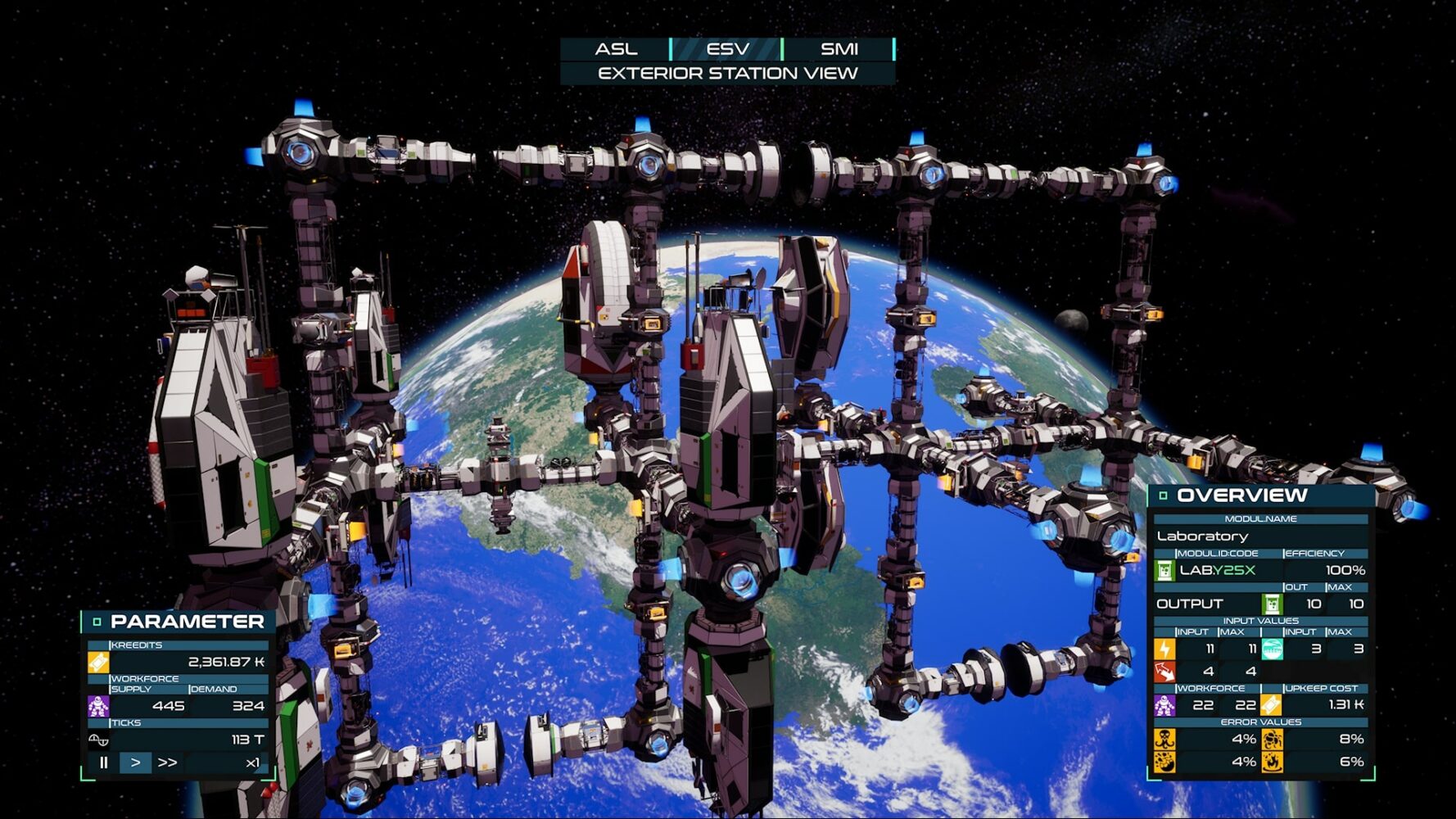
Games like orbit.industries are based on a very engineering and science-centric industry – how much background work and research did the dev team do on real life space exploration and engineering while building the game?
LAB132: Quite a lot, yes. Especially when creating all the modules and systems – defining which ones we want to implement, what their names should be and what their function will be. A lot of the modules available for building have a real-life scientific basis and may be found on actual space stations. But of course there are also modules that do not exist in real life, these either have a real-life scientific theory behind them or they are just “for fun” 😉 The Penrose Generator for example does not exist and probably never will, but there is an actual “theory” about it (creating an artificial, small black hole to generate energy), or more like a proposal for a device that will probably never be built, by Roger Penrose. And of course there are very Sci-Fi-like modules as well that do not exist in real life, but oftentimes do in Sci-Fi literature and movies (like Star Trek), like a Transporter for example.
Do you think orbit.industries is more a simulator, tycoon or strategy game – and which groups of players do you think will enjoy it the most?
LAB132: We think it is an economic building game at its core (very much like a tycoon) with simulation elements. It simulates the management of a space station with a lot of different aspects (expanding the station, making sure all resource needs are met, earning money to keep the station going). There are some strategic aspects to it since players often may find themselves in situations where they have to weigh their options carefully and plan out their next steps in order to achieve their goal(s).
For example which contract work (“project”) to choose next: Which modules/systems do they require and how long will these stay occupied? How much reward do I get in return and what is the cost/benefit relation?
Or when deciding how to expand the station even further: Which modules should be built next? What are the next steps in order to pursue the overall mission objective, what do I need to build to make progress here? What kinds of projects are available and which modules do they require?
We think that our main audience may be mid-core gamers who enjoy the overall themes of the game (Sci-Fi / Space) and/or like to take on the challenges of simulation/management games.
Also Read
Transmogrify PC Review: The Best Way To Defeat An Enemy
A video game protagonist wakes up in an on-fire science lab with nothing but an AI and a high-tech gun to…
Defy the Gods as a Witchy Moon Goddess in Hades 2
Greek-mythology-themed roguelike Hades is getting a sequel, but developer Supergiant has kept the details scant beyond a Hades 2 reveal trailer…
What is unique about orbit.industries compared to some of the other space station building games out there?
LAB132: There are 3 main differences between orbit.industries and other space station building games:
Platforms: The genres simulation and strategy aren’t as present on consoles as they are on PC platforms like Steam. From the beginning of orbit.industries, we planned out the game as a PC AND console game (e.g. designing/implementing controls with gamepad-first in mind), especially since LAB132 has set its focus on console games anyway. Orbit.industries will be released not only for PC, but also for PS4, PS5, Xbox One, Xbox Series, and Switch, covering all major platforms, thus being able to reach even more players.
Setting: There are various space simulation games with a focus on either flying space ships or building a base on a foreign planet. But building up and managing a space station in orbit as the key element of a game is not as widely spread.
Graphics: In comparison with direct competition – games that focus on building and managing a space station – orbit.industries is able to set itself apart with its graphics and style. Similar games are almost always 2D, and/or kept in a comic-like style and offer players a topdown or isometric view. Orbit.industries however offers a realistic 3D style.
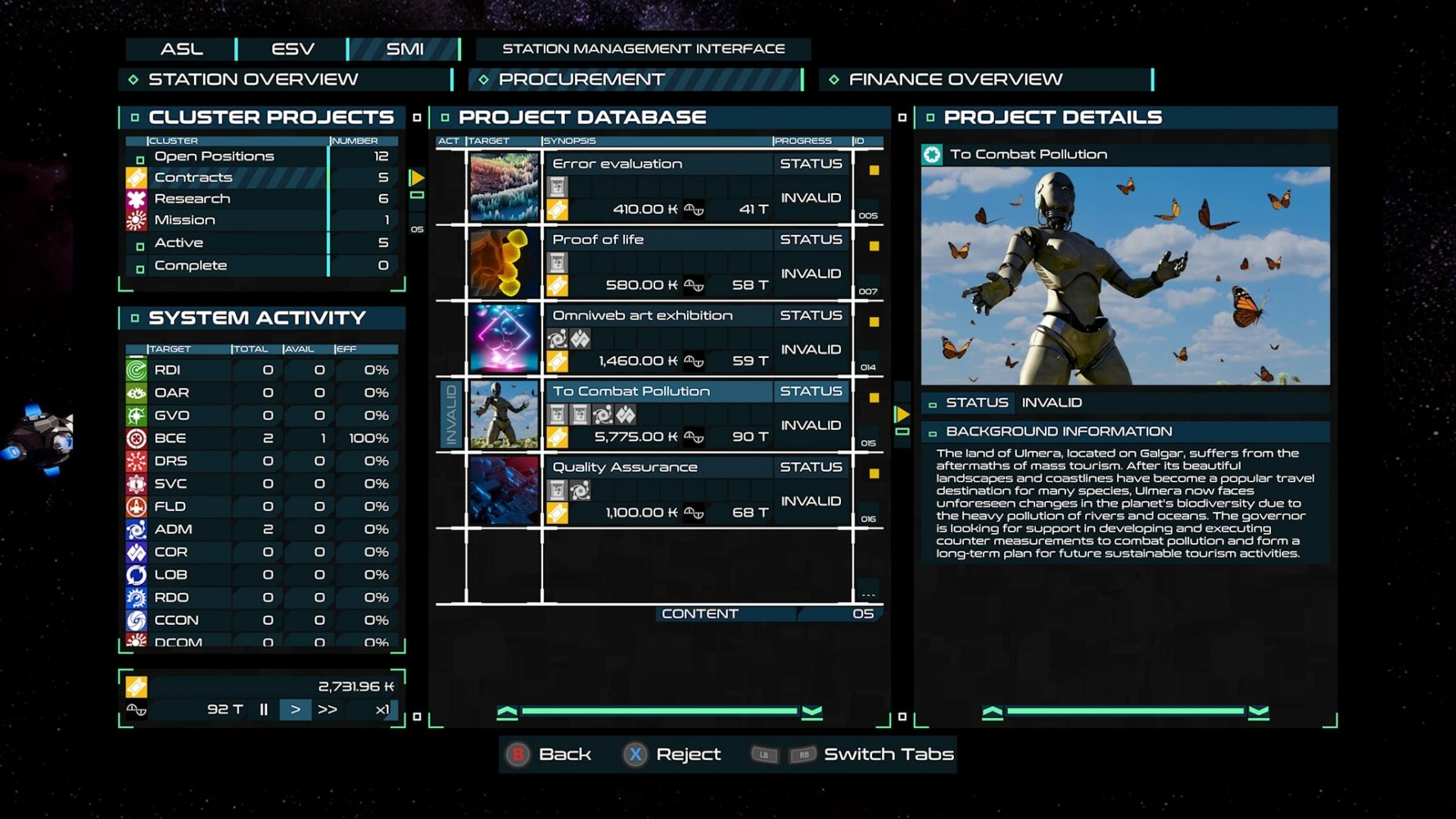
Having a clear overview of all the different systems in your station is a key part of orbit.industries, could you talk about how you designed the UI to make that easily readable?
LAB132: UI is probably a key element for all simulation/management/strategy games – with all its ups and downs. Making sure players have all the information available they might need, but also changing the UI and placement/look of elements depending on the context, as well as trying not to overload the screen at the same time is definitely a challenge of its own. Especially for consoles and playing with gamepad/controller, navigating the UI should not be too much of a pain. And on Switch for example, you have to make sure that everything fits well on the small screen when playing in handheld mode.
So our approach was to collect whatever information we think players will need in a certain screen/context and then work on the look and placement of UI elements in iterations. We did several mock-ups for the main screens (ESV, ASL, Procurement) and then continued from there. Of course along the way changes and adjustments needed to be done following feedback from tests done by us and our publisher. As for the look of the overall UI, we wanted to really aim for a “typical” Sci-Fi look – rather “cool” blue/green color schemes on dark background, make it more restrained and not as much “in your face”.
What game engine is orbit.industries built in and why did you choose it?
LAB132: orbit.industries is based on Unreal Engine 4, which has always been the Engine “of our choice” when developing games 🙂 In our opinion it may not be as “beginner friendly” as e.g. Unity, but it offers more possibilities, especially when accessing the source code directly, and it is more customizable if you know how to use the different features and elements.
Orbit isn’t your first title as a studio – what lessons from your other games (e.g. SCHACHT and SynErGame) have carried over to orbit.industries?
LAB132: LAB132 has developed and published Schacht in 2017/2018 and since then worked on many other projects for publishers, other studios and other kinds of clients, contributing to various successfully released titles. This helped us “professionalize” our studio and our work over the years. Especially all the experience we were able to gain with console projects has contributed largely to the console versions of orbit.industries, making sure we have our eyes open to things like performance, platform-compliance, and so on. This probably “saved us” from making some unnecessary mistakes during development. Orbit.industries had a bigger scope and budget than Schacht, which of course came with some new challenges in terms of project planning, but also enabled us to pursue something a bit bigger this time 🙂
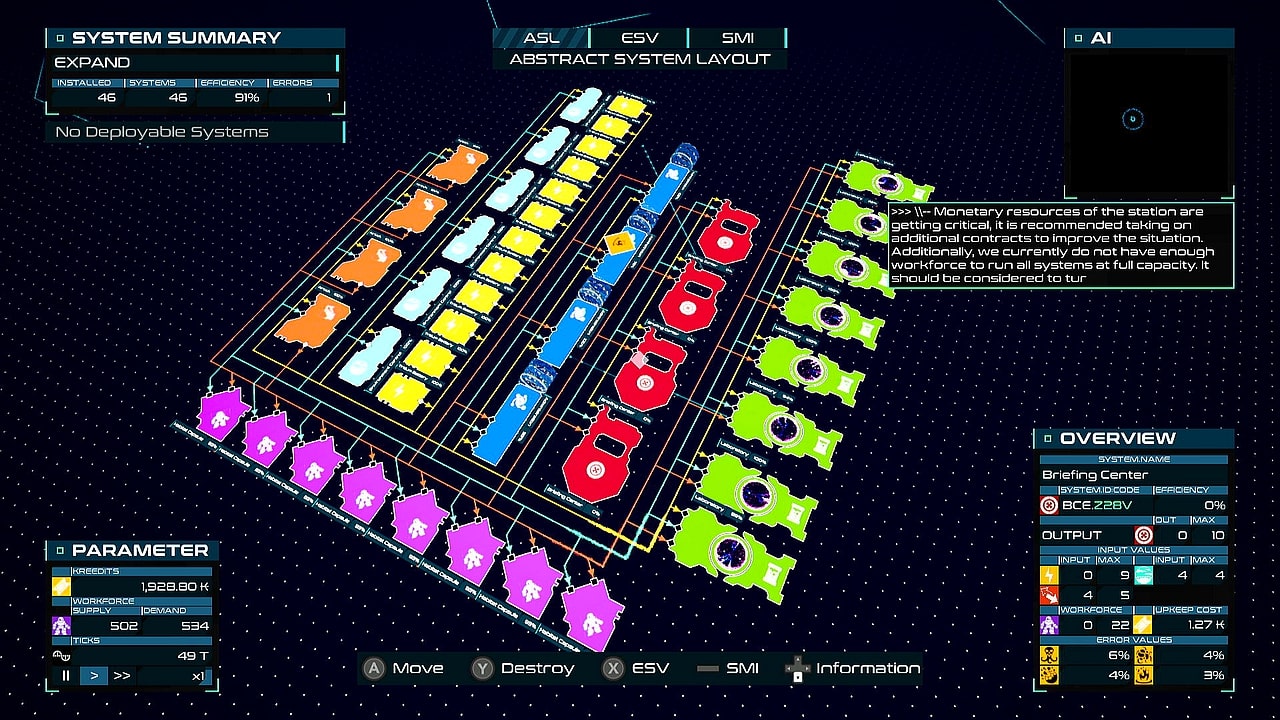
Are you currently collaborating with any third party composers/musicians or are you going to create orbit’s soundtrack in-house?
LAB132: All music and sound effects have been done by an external composer/sound designer (Vitalis Eirich, https://www.vitalis-eirich.de/). The game does not have a huge team behind it, 9 people have contributed to it through LAB132, and we do not have “our own sound guy/girl” 🙂 So we’ve worked together with Vitalis on music and sound.
Orbit’s Open Beta has been running for a few weeks this month – have you learned anything useful so far about orbit.industries and how it is played? When can we look forward to a full release?
LAB132: The Open Beta phase has been very helpful for the further polishing of the game! It is so valuable to get feedback from players directly, who might have a totally different look on the game and different expectations. After almost 5 years of (on and off) development, it is hard for developers not to be completely “blind” for their own product!
We’ve learned a lot about how players want to play the game and what they expect of it. Some balancing problems, that we thought would be a big issue, turned out not to be a problem at all, for example. But on the other hand, things that we as developers thought would be no issue or pretty self-explanatory turned out needing more thought, leading us to re-think when and how we communicate certain aspects of the game to players.
But all in all, fortunately, it encouraged us that we are on the right path with our game and motivated us to make it fully ready for release and what’s to come afterwards!
Orbit.industries is being published by indie publisher Klabater – how did you find each other and what made you choose to publish orbit.industries with them?
LAB132: We decided early on, roughly during the prototyping phase in 2019/2020, that we wanted to pursue a cooperation with a publisher for the release of orbit.industries. It took us a while to reach a point in development, where we were ready to show and present our game to somebody. We wanted to reach a certain stage in development already before looking for a publisher, because we wanted to make sure that the “core” of the game would be well transported and already show and tell what our vision for the game was. So we started looking for a publisher in summer 2021 when development was already well progressed. We’ve actually stumbled upon Klabater on a blog (I think it was on Reddit if I remember correctly) where people collected names of indie-friendly publishers. Of course we’ve all heard the story of unfair or imbalanced relationships between publishers and developers, so contacting somebody “indie-friendly”, who might have the right expectations and tools for us, sounded like the right path.
What’s next for LAB132 and orbit.industries?
LAB132: orbit.industries will be released very soon, which is beyond exciting for the team! We will of course be there from day one, collecting and answering player feedback and questions, and we already have some ideas how the game could be improved or expanded even more, in terms of future patches but also potential DLCs.
LAB132 has been working on several other projects with publishers and other studios during the whole development phase of orbit.industries, to secure financing for our game and also because contract work (co-development, porting, and so on) is a big part of our company. But in terms of LAB132-owned titles, we are indeed already making plans for our next game. There are still some things to sort out, but if everything goes as planned (well, when does that ever happen :D) we will be able to start development in late summer 2022.

